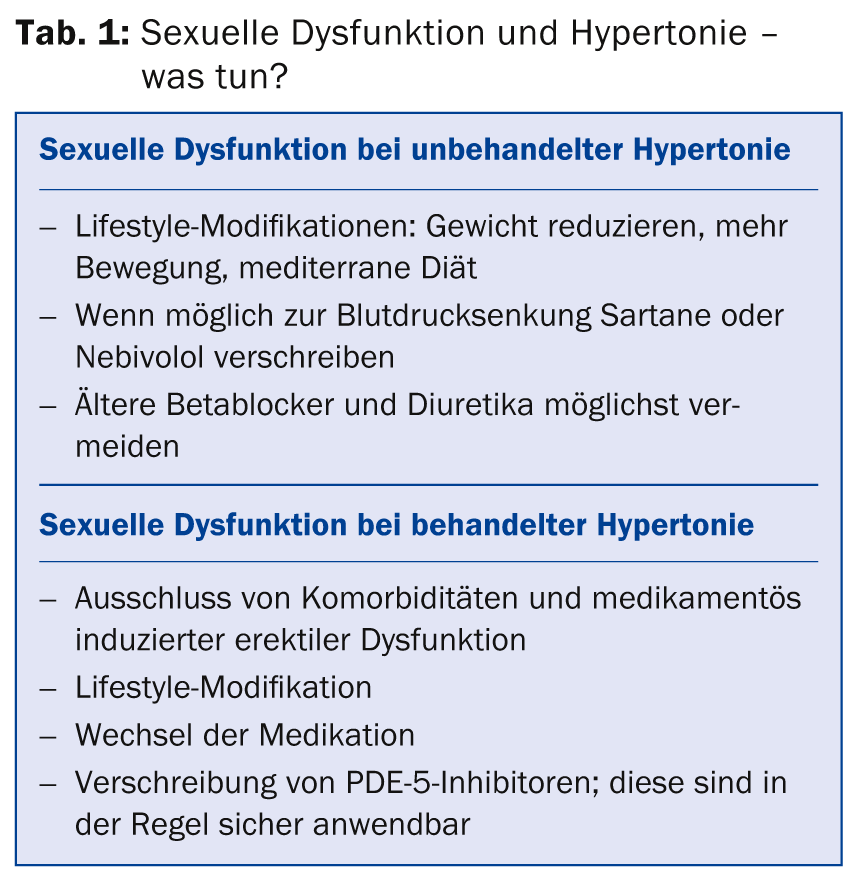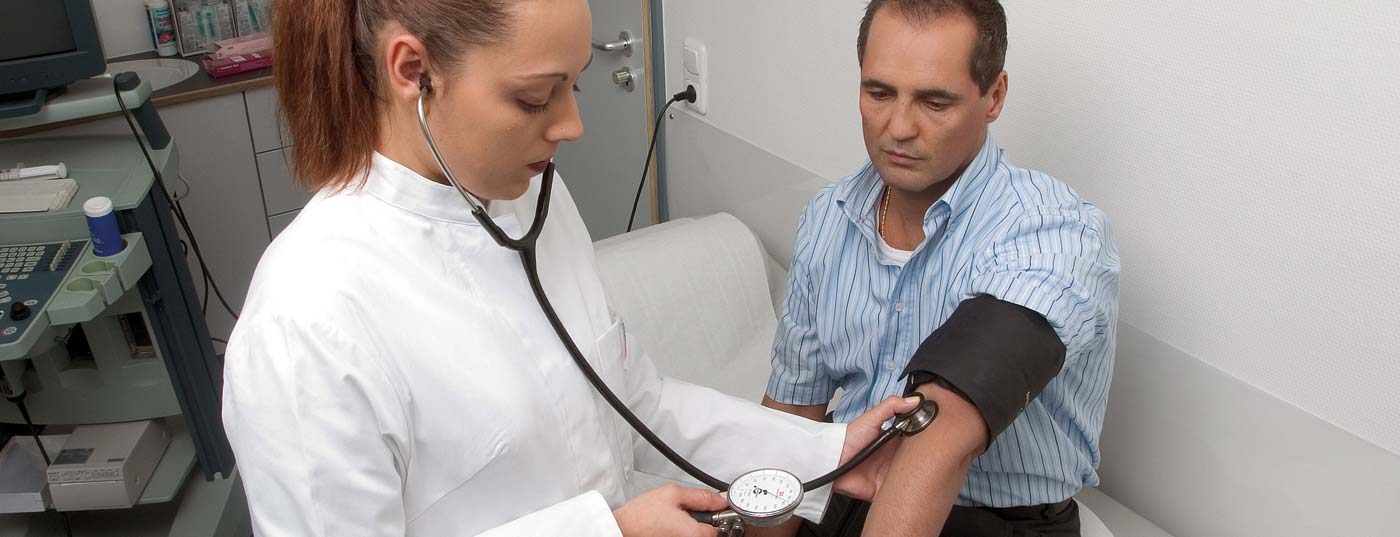On January 15, 2015, the Zurich Hypertension Day was held at the University Hospital Zurich. The topic of correct blood pressure setting is obviously burning under the nails of primary care providers, because the large lecture hall East was already filled to capacity five minutes before the event began. In their presentations, the speakers discussed not only news from the clinic, but also practice-related topics such as blood pressure control in the elderly or sexual dysfunction as a side effect of antihypertensive treatment.
Prof. Michel Burnier, MD, Lausanne, recalled that among 60-year-olds, about one in two is hypertensive, and that isolated systolic hypertension increases with age. There is a big difference in hypertension treatment for the elderly between active 65-year-olds and bedridden 85-year-olds. However, many guidelines – such as those in the USA – do not differentiate: All persons over 60 are considered “elderly. The ESC guidelines recommend lowering systolic blood pressure (SBP) to 140-150 mmHg in elderly patients younger than 80 years of age with SBP above 160 mmHg. Whether older people with SBP between 140 and 160 mmHg still need an antihypertensive at all is unresolved. In many studies aiming to reduce SBP below 140 mmHg, this has not been achieved – one of the main reasons why the current guidelines have increased the target to 150 mmHg. Evidence for the benefit of lowering below 140 mmHg does not exist.
Honorary rescue of renal denervation
Current information on renal denervation was provided by Prof. Thomas F. Lüscher, MD, Zurich. In the Symplicity HTN-3 trial, in which half of the patients were “treated” with Sham ablations, no significant reduction in blood pressure was seen in the denervated patients [1]. Prof. Lüscher expressed doubts about the quality of the interventions. Analysis of the data showed that most patients probably did not ablate well, meaning that not enough sympathetic nerves were cut. “Also, it is important to ablate near the renal artery bifurcation, that is, near the kidney, not near the aorta,” Prof. Luescher said. “It’s the only way to catch enough nerve cords.” The speaker recommended that further studies on renal denervation be conducted.
Blood pressure reduction in comorbidities
In his presentation, Prof. Edouard Battegay, MD, Zurich, gave tips on the correct antihypertensive treatment for common comorbidities. In most patients with diabetes, blood pressure values of 130/80 mmHg are appropriate – lower values increase the risk of “major adverse effects,” although the risk of stroke decreases. It is reasonable for most diabetics to take at least one dose of an antihypertensive in the evening, especially if the cluster is diabetes, hypertension, and obstructive sleep apnea syndrome. Evening medication improves blood pressure control at night, just as CPAP therapy does. The decision on what time of day to take antihypertensive medications is best made based on 24-hour blood pressure measurement.
Patients with mild renal insufficiency do not benefit from blood pressure values below 130/80 mmHg (compared with 140/90 mmHg). However, renal insufficiency increases salt sensitivity.
20% of hypertensives have a painful condition such as osteoarthritis or back pain. Pain and pain medications can also increase blood pressure. NSAIDs should be avoided because they cause volume retention and decrease vasodilation. But acetaminophen can also raise blood pressure. In many cases, therefore, there is a therapeutic conflict between pain therapy and blood pressure therapy in which priorities must be set.
Orthostasis is especially a problem in old age and in patients with Parkinson’s disease. Lowering blood pressure too low exacerbates the risk for falls and accelerates the progression of dementia. It is recommended to measure blood pressure also in standing position in people over 85 years of age; if this value is lower than the blood pressure measured in sitting position, the antihypertensive therapy should be based on the “standing blood pressure” to avoid overtherapy.
New active principle for lowering blood pressure
Prof. Dr. med. Frank Ruschitzka, Zurich, presented a new development: the active substance (LCZ696), a combination of an angiotensin receptor antagonist and an inhibitor of the enzyme neprilysin, which accelerates the breakdown of vasoactive hormones. The administration of LCZ696 alone hardly lowers blood pressure, but in combination with valsartan a significant blood pressure reduction can be observed. The PARADIGM-HF trial tested the new drug combination against enalapril in heart failure [2]. The study was stopped early because patients in the LCZ696 group died significantly less frequently and were hospitalized less than patients in the enalapril group. Only few side effects occurred. Approval of the new drug is expected by the end of this year or early next year, initially with the indication heart failure.
Hypertension and sexual dysfunction
“The risk for sexual dysfunction is twice as high in hypertensives as in normotensives,” explained PD Thomas Dieterle, MD, Kantonsspital Baselland, Liestal. Three main causes are responsible for this: aging processes, psychological factors and vascular disorders. The definition of sexual dysfunction is relatively simple in men (erectile dysfunction, ED), but much more complex in women (decrease in libido, lack of lubrication, anorgasmia, etc.).
ED often precedes cardiovascular events by years because the thin penile artery becomes constricted by atherosclerosis earlier than the thicker coronaries. Men with ED have a significantly increased risk of cardiovascular events, stroke, etc.; in women, a similar association between disorders of sexual function and cardiovascular disease is not known.
Antihypertensive therapy can worsen sexual dysfunction, but it can also improve it. Diuretics and beta-blockers are the most likely of all antihypertensives to trigger ED. Dr. Dieterle emphasized that this is also partly a psychological side effect, as shown in a study by Silvestri et al. showed: patients who knew which active ingredient they were taking and which side effects could occur suffered more frequently from ED than patients who did not know the active ingredient [3]. Sartans and ACE inhibitors can improve ED, as can nebivolol, the only beta blocker; other beta blockers are contraindicated in ED. Calcium antagonists are probably neutral with respect to this side effect. Again, there is little data on this in women. “Sexual dysfunction is one of the main reasons for malcompliance in hypertension,” the speaker reminded. “It is therefore important to take corresponding complaints seriously and to initiate measures” (Tab. 1).

Source: 10th Zurich Hypertension Day, January 15, 2015
Literature:
- Bhatt DL, et al: A Controlled Trial of Renal Denervation for Resistant Hypertension. N Engl J Med 2014; 370: 1393-1401. DOI: 10.1056/NEJMoa1402670.
- McMurray J, et al: Angiotensin-neprilysin inhibition versus enalapril in heart failure. N Engl J Med 2014; 371: 993-1004. DOI: 10.1056/NEJMoa1409077.
- Silvestri A, et al: Report of erectile dysfunction after therapy with beta-blockers is related to patient knowledge of side effects and is reversed by placebo. Eur Heart J 2003; 24(21): 1928-1932.
HAUSARZT PRAXIS 2015; 10(3): 58-59











